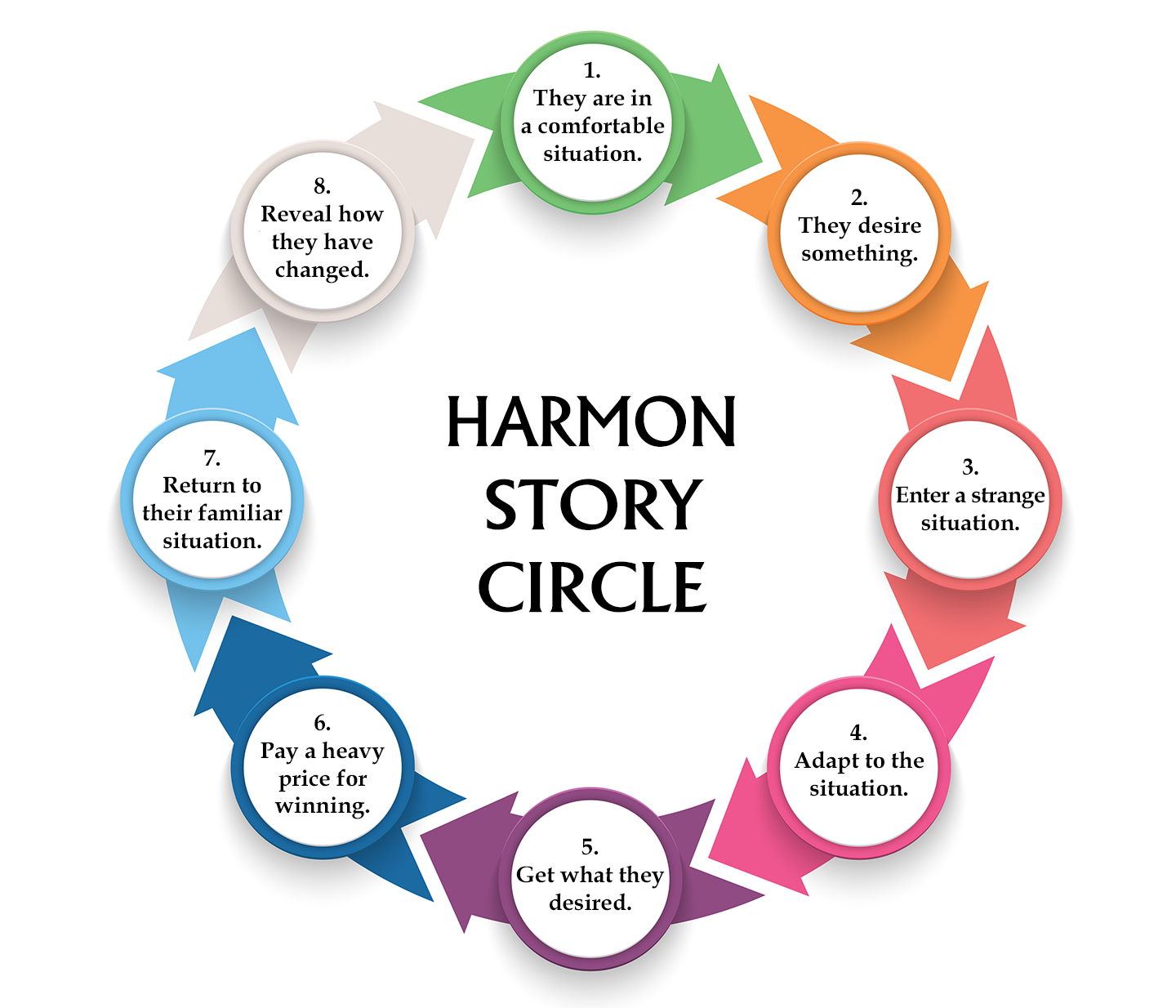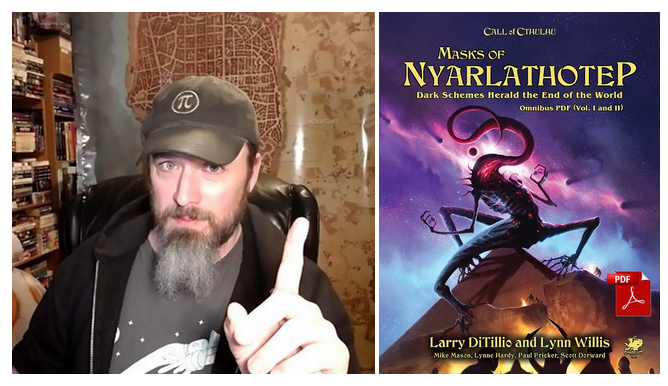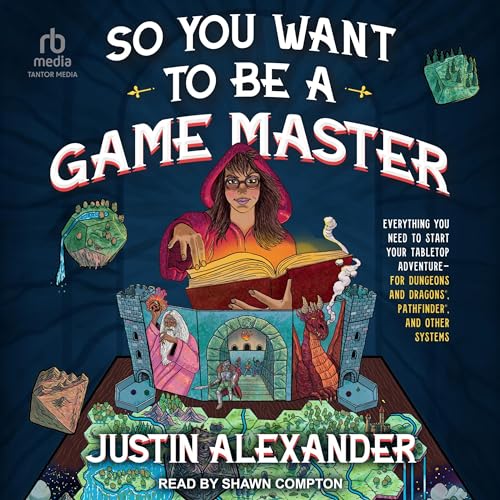The Harmon Story Circle is a character-focused storytelling formula created by Dan Harmon, who’s also the creator or co-creator of TV shows like Community and Rick & Morty:

It’s a very effective structure for episodic storytelling, because it makes the events of each episode meaningful, easily incrementing character growth and changes to the status quo, which creates a constant forward momentum throughout, for example, a season of television.
It’s also a very common story structure to see played out at the table during a roleplaying game (with one notable exception, which we’ll get to in a moment), because these beats emerge naturally from the “scenario hook + adventure site” concepts that we commonly use. For example, consider a stereotypical dungeon scenario:
- The PCs are in the local village. (A place of safety / comfort / familiarity.)
- A hooded stranger hires them to retrieve an item from a nearby dungeon. (They now have a desire to complete the job.)
- They enter an unfamiliar situation (i.e., the dungeon).
- They adapt to the dungeon, learning its geography and figuring out how to overcome its challenges.
- They retrieve the item they were sent to find.
- They return to the familiar situation (i.e., the village).
- They have earned XP and perhaps gained new magical items, being changed as a result of their journey.
The PCs begin in their home base, a scenario hook prompts them with a desire, the adventure site (whether dungeon, raid, or the like) provides a challenging situation, and the mechanical rewards of your system of choice level the character up (literally or metaphorically), changing them over time. Repeat.
Similarly, consider a typical run in Shadowrun, Technoir, or Cyberpunk Red: Relaxing between jobs gives a safe status quo, but then the PCs are hired to breach a megacorp’s servers and retrieve sensitive data. The heist takes them into an unfamiliar situation where they have to learn and adapt (i.e., plan the job). Once they’ve retrieved the data, they get paid and go back to lurking in the seedy bar or digital hacker enclave or private island where they got the job in the first place.
It’s a satisfying loop that can be effectively run in perpetuity.
But you may have noticed that we skipped a step:
PAY A HEAVY PRICE.
In too many RPG scenarios, the PCs just kind of skim over the surface of the scenario: It’s a thing they’re doing, but not really a thing that’s affecting them. This partly indicates a lack of investment – the PCs don’t have any skin the game! – but it’s also a lack of consequences: Whether they succeed or fail, the effect of the scenario is ephemeral. Within a couple sessions you could imagine having skipped the scenario entirely and nothing in the campaign would be different.
This is made worse because, in practice, success is predetermined: The possibility of the PCs not killing the raiders or retrieving the data-package is a completely alien idea to many GMs, and considered anathema by wide swaths of modern scenario design.
One reason for this is that RPG mechanics and scenarios often frame everything as life-or-death stakes: Failure isn’t paying a heavy price; it’s everybody dying and the end of the campaign. Since that’s not a desirable outcome for many groups, the GM has little choice but to ensure the PCs succeed.
Even when death isn’t on the line, GMs can also fall into the trap of framing binary outcomes: You either kill all the raiders or you don’t. You either steal the data-packet or you don’t. Paying a heavy price, on the other hand, usually means some form of non-binary, either in the primary objective or in ancillary consequences. For example:
- You steal the data-packet, but get identified by the megacorp. Now there’s a huge bounty on your heads.
- You hunt down the raiders, but not before they start killing hostages.
- You can stop the Red Hand from claiming the Sword of Fatherfall by taking it from its resting place, but only if one of you is willing to take up the sword and suffer its curse.
Next time you’re designing a scenario, think about the stakes: Is success defined as restoring an unaltered status quo? Is the only possible failure state a TPK? See if you can break out of simple binaries and add the complexity you need for the scenario to have meaningful fallout.
You can root these possible outcomes in meaningful choices made by the players – e.g., which faction do they give the Ruby to? – but it becomes even more powerful when a complex and nuanced scenario gives the opportunity for the players to invent their own meaningful choices! Either way, these choices are significant because they’re how the characters take ownership of the price they pay: You could have used the cure to save your beloved sister, but instead you gave it to the Alchemist’s Guild so that they could synthesize it and save hundreds or thousands of lives.
(Or vice versa.)
These are the crucibles through which PCs change and grow over time, becoming deeper and richer characters as the campaign plays out.
Tip: Another thing to think about is using scenario hooks that matter to the PCs. Due to the influence of published adventures, there’s a tendency for scenario goals to be externalized: The PCs have to do something because someone else wants them to do it. If the PCs are instead pursuing a goal because THEY want it to happen, it’s a lot easier to have meaningful outcomes that matter to them. See GM Don’t List #12: Mail Carrier Scenario Hooks.
SYSTEMIC RESPONSE
Some RPGs also address this gap systemically.
For example, what set Call of Cthulhu apart from the competition when it premiered in 1981 and why has it gained such a reputation for powerful roleplaying?
In part, it’s because the Sanity system hard codes a heavy price into the standard gameplay loop: It’s basically impossible for a PC to engage with a Call of Cthulhu scenario and come away unscathed.
Technoir achieves a similar effect through its locked adjectives: A character can recover from a fleeting or sticky adjective, but an adjective that becomes locked – whether it’s physical injury, mental trauma, or a shift in belief or personality – signifies a permanent change in the character.
Another great example is Blades in the Dark, which weaves a complex web of Stress, Trauma, Heat, and Vice and then bakes those costs/consequences into every die roll.
CHALLENGE TO THE PLAYERS
Regardless of scenario or system, understanding the heavy price of the Harmon Story Circle can also be both a challenge and an opportunity for you as a player. It is not, after all, the GM’s responsibility to roleplay your character for you. Quite the opposite, in fact. So you can make the conscious choice not to skim past an adventure.
If your GM is pitching you big, juicy stakes, of course, that’s fantastic: Take what they’re offering you and run with it. But even when the GM or scenario isn’t framing up these opportunities, you can still proactively think about how a scenario is affecting your character:
- Is there anything that might cause them to change their values or goals?
- Is their desire for something so strong that it might make them sacrifice something or compromise their own values? What impact will that have on them in the long run?
- Why is the group’s current agenda important to your character?
- If it’s not important, can you look for a moment when it becomes important to them? (Don’t be afraid to go big for the, “Well now it’s personal!” moment.)
- Or, if it’s already important to them, is there a moment where the character questions that?
And so forth.
If you’re looking for inspiration, think about your favorite characters from films or books: How and why and when are Frodo or Paul Atreides or George Bailey or Commander Adama or Rick Blaine or Ilsa Lund or Laura Roslin or Elizabeth Bennet transformed by their stories?













